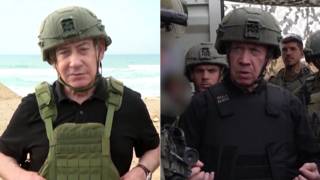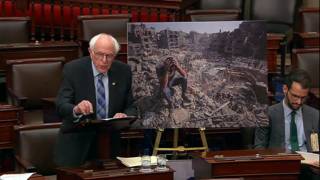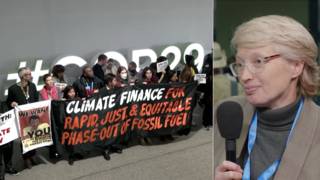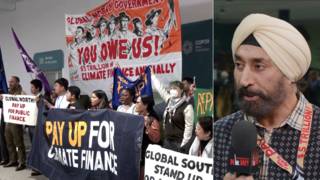HeadlinesOctober 14, 2008
Treasury Proposes Partial Nationalization of US Banks
The Treasury Department is expected to announce plans today to partially nationalize the US banking system by investing $250 billion in the country’s financial institutions. As part of the plan, nine of the largest US banks will be forced to accept partial government ownership. The banks include Citigroup, Bank of America, Wells Fargo, Goldman Sachs and JPMorgan Chase. The government is also planning to provide insurance on all deposits in non-interest-bearing accounts and insure certain types of bank debt. Britain and other European governments have already launched similar efforts to nationalize their banks.
Dow Soars 11 Percent; Japan Nikkei Up 14 Percent
The unprecedented government intervention has been well received by investors. On Monday, the Dow Jones Industrial Average soared by 936 points, its largest point gain ever. The 11 percent jump was the largest one-day increase since the 1930s. In Japan, the Nikkei share average increased by a record 14 percent today.
Questions Raised About Bank Nationalization Plan
Under the proposed $250 billion plan, the Washington Post reports, there is a risk that banks will take the new government capital and use it to bolster their balance sheets but still not resume lending. The Treasury is not getting any specific contractual guarantee to prevent that from happening. The Wall Street Journal reports the move to partially nationalize the banks “intertwines the banking sector with the federal government for years to come and gives taxpayers a direct stake in the future of American finance, including any possible losses.” British Prime Minister Gordon Brown said the relationship between governments and markets is changing.
Gordon Brown: “What I think we’ve got to realize, that unless we build a global system of coordination and supervision, then we are as likely to have another crisis that starts somewhere else that we didn’t understand was happening, because we had no idea of the risks that people were taking. So I think it’s actually a new relationship between markets and government that we’re looking for.”
Paul Krugman, this year’s winner for the Nobel Prize for Economics, criticized the Bush administration’s handling of the economic crisis so far.
Paul Krugman: “Obviously, it hasn’t been enough so far, right? Things are getting worse. And I’ve been writing about that a lot. Yesterday was the first day I actually felt that policymakers exceeded expectations instead of falling short, that the actual decisions reached in that European summit were better than I expected. And so, that was favorable, and I’m feeling more optimistic today than I was, let’s say, Thursday. It looks like policy is starting to make more sense. But, you know, nobody knows where — I think we’ve clearly been on the wrong track up ’til now.”
Obama Outlines New Economic Proposals
On the campaign trail, Democratic presidential nominee Sen. Barack Obama proposed four steps to create jobs and to cushion Americans against the effects of the economic downturn. Speaking in Toledo, Ohio, Senator Obama proposed a ninety-day moratorium on most home foreclosures.
Sen. Barack Obama: “For those Americans in danger of losing their homes, today I’m also proposing a three-month moratorium on foreclosures. If you’re a bank — if you’re a bank or a lender that is getting money from the rescue plan that passed Congress, and your customers are making a good-faith effort to make their mortgage payments and re-negotiate their mortgage, you will not be able to foreclose on their home for three months. We need to give people the breathing room to get back on their feet.”
Other parts of Obama’s plan include tax credits for firms that create new jobs, penalty-free withdrawals from retirement accounts and to eliminate income taxes on unemployment benefits.
Sen. Barack Obama: “But today I’m calling on Congress to pass a plan so that the IRS will mail out the first round of those tax cuts as soon as possible. We should get you a rebate in your pockets to deal with heating your homes this winter, making sure that — making sure that you can afford the new coat for your child or maybe even a new computer to help them in school. We should also extend and expand unemployment benefits to those Americans who have lost their jobs and are having a tough time out there finding new ones in this weak economy.”
Advisers to John McCain say the Arizona senator will make a series of new proposals for the economy today. McCain’s handling of the economic crisis is coming under increasing scrutiny. Political analyst Darrell West of the Brookings Institute said McCain’s campaign strategy of attacking Obama has backfired.
Darrell West: “I think the big thing that has led to John McCain’s demise in the surveys has been the financial meltdown. But it also is a time period where McCain has been on the attack against Barack Obama, and at that very time his own poll numbers have dropped and the favorability ratings of Barack Obama actually have improved compared to McCain. So McCain needs to change the tone of this campaign. The negative attacks haven’t appeared to work very effectively. And so, I think over the closing days of this election he really needs to lay out his own positive vision of what he wants to accomplish as president.”
Anheuser-Busch, Bottled Water Lobby Sponsor Presidential Debate
On Wednesday, Obama and McCain will meet for their final debate before the election here in New York at Hofstra University. No third party candidate has been invited to participate. The New York Times reports sponsors of Wednesday’s debate include the beer giant Anheuser-Busch; the International Bottled Water Association; and EDS, a subsidiary of Hewlett-Packard.
Judge Orders Michigan to Restore Names of 1,400 Purged Voters to Rolls
A federal judge has ordered election officials in Michigan to restore the names of over 1,400 voters who have been illegally purged from the rolls this year. Judge Stephen Murphy said election officials cannot automatically cancel a voter’s registration if the card is returned as undeliverable by the post office. The judge said Michigan’s practice violates federal law because voters aren’t given adequate notice of their removal and there is no waiting period. The American Civil Liberties Union praised the decision. The ACLU’s Michael Steinberg said, “We are thrilled that thousands of voters who were illegally removed from voter rolls will be able to vote in November’s historic presidential election. Disenfranchisement undermines our democracy, and today’s opinion restores some confidence in our electoral system.”
Iraq Opens Bidding to Develop Oil Fields
Iraq opened bidding on Monday for the first round of contracts to develop its oil fields since the US invasion and fall of Saddam Hussein. Iraq’s oil minister Hussein al-Shahristani announced Iraq is seeking bids on twenty-year contracts to develop six major oil and two natural gas fields. Iraq has the world’s third-largest oil reserves with known reserves of 115 billion barrels. Last month, Royal Dutch Shell became the first foreign oil giant to open an office in Iraq in three decades. Shell was one of the original partners of the Iraq Petroleum Company before Saddam Hussein nationalized Iraq’s oil resources in the 1970s.
US Condemns Attacks on Iraqi Christians
In other Iraq news, the US embassy in Baghdad has condemned recent attacks on Iraqi Christians in the city of Mosul. Over 3,000 Christians have fled the city due to a wave of killings and kidnappings. Christians from Mosul say they have been the victims of a systematic plan to cleanse them from the area.
Iraqi Woman: “We are seven to eight families from Mosul. We came here after a regrettable attack, a killing of a father and his son in al-Sediq area. What did we do? What is the government’s stance in regard to this incident? There has been a month of killing of Christians and bombing of their houses. What did those families do? They became homeless with no food, no drink, no clothes, no supplies and no money. What did we do? Where shall we go? We want to return back to our homes.”
Thousands Begin 124-Mile March in Bolivia to Support Morales
Thousands of Bolivians are participating in a massive 124-mile march from the city of Caracollo to the capital of La Paz to show support for President Evo Morales and his proposed constitutional reforms. A referendum is scheduled for early December. Morales is seeking to redistribute land and energy resources from rich landowners to indigenous peasants, who make up over 60 percent of the population. On Monday, Morales joined with social leaders at the start of the march.
Evo Morales: “We hope that the people in Congress, the opposition, see the Bolivian people’s efforts and approve the constitutional reforms sooner in the journey.”
US War Resister Ordered to Leave Canada
A US war resister living in Canada has been ordered to leave the country by October 30 or be deported, after being denied refugee status. Former Army sergeant Patrick Hart had served in the US Army for nearly ten years before fleeing to Toronto in 2005 as his unit was preparing for a second deployment to Iraq.
10,000 Acres Burn in California Wildfire
And in California, 800 county and state firefighters are battling two wildfires in the San Fernando Valley near Los Angeles. The fire has already burned 10,000 acres. Gov. Arnold Schwarzenegger has declared a state of emergency in Los Angeles and Ventura counties.
Most popular
- 1
- 2
- 3
- 4
Non-commercial news needs your support
Please do your part today.











Media Options